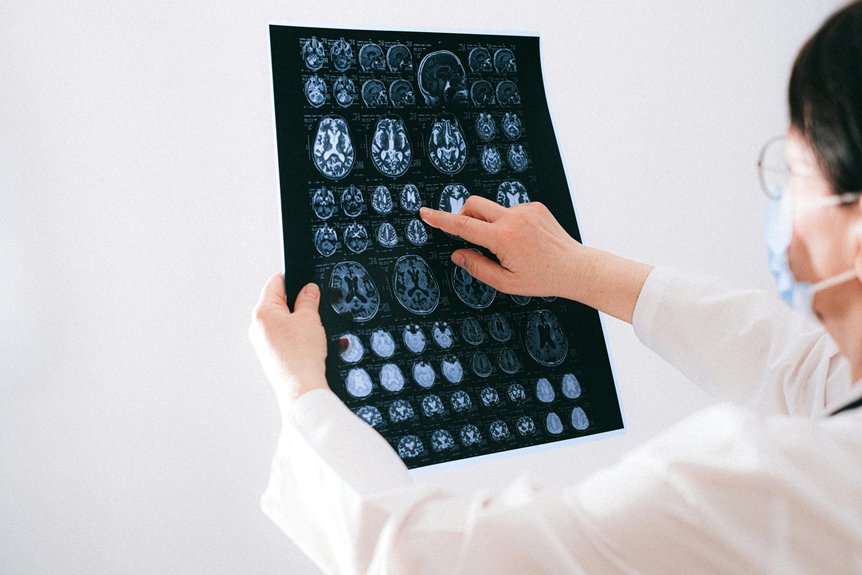At Lancaster General Health Neurology, you’ll find an extensive approach to neurological care that addresses a wide range of conditions. Their specialized evaluations cover everything from headaches to epilepsy, utilizing advanced imaging techniques for precise diagnoses. With tailored treatment plans and robust support programs, you can expect a focus on enhancing your quality of life. Discover how their dedicated services can make a difference in your health journey.
Key Takeaways
- Comprehensive neurological evaluations assess cognitive function, motor skills, and sensory responses to develop tailored treatment plans.
- Advanced imaging techniques include MRI, fMRI, DTI, MRA, and EEG for accurate diagnosis and monitoring.
- Specialized treatment programs focus on headache and migraine management, epilepsy diagnosis, and multiple sclerosis care.
- Community outreach and support groups foster connections among individuals facing neurological challenges for emotional support.
- Educational workshops provide insights into treatment options, coping strategies, and advocacy skills for informed decision-making.
Comprehensive Neurological Evaluations
When you seek an extensive neurological evaluation at Lancaster General Health Neurology, you’re engaging in a meticulous process designed to assess the full spectrum of your neurological health.
This thorough assessment includes a thorough history and clinical examination, focusing on any neurological conditions you may have. Your physician will evaluate cognitive function, motor skills, and sensory responses, ensuring a precise patient assessment.
Advanced diagnostic tools may complement this evaluation, providing insights into your overall neurological status. The goal is to identify any underlying issues and craft a tailored treatment plan, enhancing your quality of life and addressing your specific needs effectively.
Advanced Imaging Techniques
Advanced imaging techniques play an essential role in diagnosing and managing neurological conditions at Lancaster General Health Neurology.
Advanced imaging techniques are crucial for accurately diagnosing and managing neurological conditions at Lancaster General Health Neurology.
With recent MRI advancements, you can expect improved imaging accuracy, allowing for more precise assessments.
Our advanced imaging services include:
- High-resolution MRI scans
- Functional MRI (fMRI) for brain activity analysis
- Diffusion tensor imaging (DTI) for white matter integrity
- Magnetic resonance angiography (MRA) for blood vessel evaluation
- Electroencephalography (EEG) to monitor electrical brain activity
These techniques enable you to receive tailored treatment plans and enhance your overall care experience, ensuring favorable outcomes in neurological health.
Headache and Migraine Management
When it comes to headache and migraine management, understanding the different types of headaches is essential for effective treatment.
You’ll explore various treatment options available, including medications and therapies, tailored to your specific needs.
Additionally, implementing lifestyle modification strategies can greatly enhance your quality of life and reduce the frequency of headaches.
Types of Headaches
Understanding the different types of headaches is essential for effective management and treatment. You can experience various headaches, each requiring specific attention.
Here are some common types:
- Tension Headaches: Often caused by stress or muscle strain.
- Cluster Headaches: Intense, unilateral pain occurring in periodic clusters.
- Migraine: Characterized by severe throbbing pain, often with nausea.
- Sinus Headaches: Related to sinus infections, causing pressure around the eyes and forehead.
- Rebound Headaches: Resulting from overuse of pain medications.
Recognizing these types helps you better communicate your symptoms to healthcare professionals for exceptional care.
Treatment Options Available
Effective headache and migraine management involves a range of treatment options tailored to individual needs. For those experiencing chronic pain from headaches, your neurologist may recommend medications, including abortive treatments for acute relief and preventive therapies to reduce frequency.
Neuromodulation techniques, such as nerve blocks and transcranial magnetic stimulation, may also be considered. Additionally, addressing underlying neurological disorders can greatly improve outcomes.
It’s crucial to engage in open discussions with your healthcare provider to determine the most effective approach for your specific situation, ensuring that your treatment plan aligns with your lifestyle and health goals.
Lifestyle Modification Strategies
Managing headaches and migraines often requires more than just medication; lifestyle modifications can play a significant role in reducing the frequency and intensity of attacks.
Here are some effective strategies you can implement:
- Dietary changes: Identify and eliminate trigger foods.
- Regular exercise routines: Aim for at least 150 minutes of moderate activity weekly.
- Stress management techniques: Practice mindfulness or yoga regularly.
- Adequate hydration: Drink plenty of water throughout the day.
- Consistent sleep schedule: Prioritize 7-9 hours of quality sleep each night.
Epilepsy Diagnosis and Treatment
When faced with the complexities of epilepsy, accurate diagnosis and tailored treatment plans are vital for ideal patient outcomes.
Your journey begins with a thorough evaluation, including seizure classification, to determine the type and frequency of your seizures. This process guides your neurologist in developing a personalized treatment plan that aligns with established treatment guidelines.
Options may include antiepileptic medications, lifestyle adjustments, or advanced therapies like neuromodulation.
Regular follow-ups guarantee that your treatment remains effective and that any necessary adjustments are made.
Trust in a holistic approach to manage your epilepsy effectively and improve your quality of life.
Multiple Sclerosis Care
When managing multiple sclerosis, you’ll benefit from extensive treatment options tailored to your specific needs.
Lancaster General Health Neurology provides a range of therapies designed to manage symptoms and slow disease progression.
Additionally, you’ll find valuable patient education resources to help you understand your condition and treatment plan.
Comprehensive Treatment Options
At Lancaster General Health Neurology, patients with multiple sclerosis (MS) benefit from a thorough range of treatment options designed to address their unique needs.
Our extensive approach includes:
- Personalized treatment plans tailored to your condition
- Advanced disease-modifying therapies to slow progression
- Neurorehabilitation programs aimed at improving mobility and function
- Symptomatic management for fatigue, pain, and cognitive concerns
- Ongoing support from a multidisciplinary team of specialists
We focus on optimizing your quality of life, ensuring that you receive the necessary resources and support throughout your journey with MS.
Your health and well-being are our top priorities.
Patient Education Resources
Understanding multiple sclerosis (MS) is essential for managing your health effectively.
At Lancaster General Health Neurology, we prioritize patient empowerment through various educational resources. Our educational workshops provide you with critical information about MS, treatment options, and lifestyle adjustments. These sessions foster a supportive environment where you can ask questions and share experiences with others facing similar challenges.
Additionally, we offer extensive materials, including brochures and online resources, to enhance your understanding of MS. By actively engaging in these educational opportunities, you’ll be better equipped to navigate your condition and make informed decisions about your care.
Neuropsychological Assessments
Neuropsychological assessments play an essential role in evaluating cognitive functioning and emotional health.
These evaluations help identify areas of concern and inform treatment plans. You’ll undergo thorough psychological testing, which may include:
- Memory and attention assessments
- Language and communication evaluations
- Problem-solving and reasoning tasks
- Emotional and behavioral assessments
- Academic and learning-related evaluations
Patient Support and Education Programs
While steering through neurological challenges, participating in patient support and education programs can greatly enhance your understanding and management of your condition.
These programs focus on patient advocacy, ensuring you have the resources and knowledge to navigate your health journey effectively. By engaging in community outreach, you’ll connect with others facing similar struggles, fostering a sense of belonging and shared experience.
Educational workshops and support groups provide critical information about treatment options and coping strategies, equipping you with tools to advocate for your health needs.
Embracing these opportunities can meaningfully improve your quality of life and empower your healthcare decisions.
Conclusion
In conclusion, Lancaster General Health Neurology provides a robust array of services tailored to your neurological needs. From thorough evaluations and advanced imaging techniques to specialized care for conditions like headaches, epilepsy, and multiple sclerosis, you’re supported every step of the way. Their commitment to patient education and community support guarantees you’re equipped to manage your health effectively. Trust Lancaster General Health to enhance your quality of life and empower you in your journey towards better neurological health.




